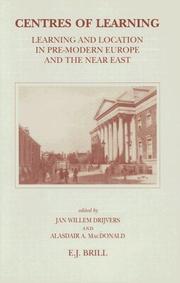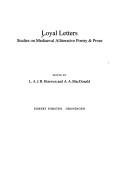| Listing 1 - 9 of 9 |
Sort by
|
Book
ISBN: 1787442977 1843845067 Year: 2018 Publisher: Cambridge : D.S. Brewer,
Abstract | Keywords | Export | Availability | Bookmark
 Loading...
Loading...Choose an application
- Reference Manager
- EndNote
- RefWorks (Direct export to RefWorks)
The Scottish poet George Lauder began as a "university wit", by imitating anti-papal satires popular in the Italian Renaissance. He set off for London as a young man, looking for patronage, but instead became an officer in the army, seeing service in France, the Low Countries, Germany, Denmark and Sweden -- an experience which provides the backdrop to the poetry of his mature years. At the Restoration he wrote a lengthy poem of advice to Charles II, and his final masterwork was a poetic conflation of the Gospel accounts of the life of Christ. Lauder was influenced by Ben Jonson, William Drummond, and by the Metaphysical and the Caroline styles. His personal library testifies to his wide range of interests, and to his acquaintance with European literature in neo-Latin and other languages. This volume traces Lauder's career, collects all his surviving verse (presented with full notes and commentary), and examines his interactions with certain of the greatest intellectuals of the Dutch Golden Age. Lauder was a British patriot and a loyal supporter of the House of Orange; above all, however, he is the author of a unique corpus of highly accomplished poetry. Alasdair A. MacDonald is Emeritus Professor of English Language and Literature of the Middle Ages, University of Groningen, Netherlands.
Poets, Scottish --- Scottish poets --- Lauder, George, --- G. L. --- L., G. --- Lawder, George, --- Scotland. --- Soldier.
Book
ISBN: 9781787442979 9781843845065 Year: 2018 Publisher: Cambridge D.S. Brewer
Abstract | Keywords | Export | Availability | Bookmark
 Loading...
Loading...Choose an application
- Reference Manager
- EndNote
- RefWorks (Direct export to RefWorks)
Multi
ISBN: 9781787442979 9781843845065 Year: 2018 Publisher: Cambridge D.S. Brewer
Abstract | Keywords | Export | Availability | Bookmark
 Loading...
Loading...Choose an application
- Reference Manager
- EndNote
- RefWorks (Direct export to RefWorks)

ISBN: 9004101934 9004247157 9789004101937 Year: 1995 Volume: 61 Publisher: Leiden New York E. J. Brill
Abstract | Keywords | Export | Availability | Bookmark
 Loading...
Loading...Choose an application
- Reference Manager
- EndNote
- RefWorks (Direct export to RefWorks)
Centres of Learning deals with the relation between learning and the locations in which that learning is carried out. It is the editors' belief that the character (and, in part, the content) of a particular aspect of learning is determined — or at least influenced — by the circumstances in which the learning process takes place. The contributions in this book deal with various aspects of learning, in a broad historical and geographical perspective, which ranges from Ancient Babylon, via classical Greece and Rome, and the Middle East (both Christian and Islamic), through to the Latin and vernacular cultures of the Christian West in the Middle Ages and the Early Renaissance.
Education, Ancient --- Education, Medieval --- Islamic learning and scholarship --- Learning and scholarship --- Schools --- History. --- History --- Education [Ancient ] --- Europe --- Middle East --- Education [Medieval ] --- Medieval, 500-1500 --- Education, Ancient - Europe - History. --- Education, Ancient - Middle East - History. --- Education, Medieval - Europe - History. --- Education, Medieval - Middle East - History. --- Schools - Europe - History. --- Schools - Middle East - History. --- Middle Ages, 500-1500 --- Medieval learning and scholarship --- Education --- Medieval education --- Seven liberal arts --- Civilization, Medieval
Book
ISBN: 1283061082 9786613061089 9047433734 9004168257 Year: 2008 Publisher: Leiden ; Boston [Mass.] : Brill,
Abstract | Keywords | Export | Availability | Bookmark
 Loading...
Loading...Choose an application
- Reference Manager
- EndNote
- RefWorks (Direct export to RefWorks)
"This collection of essays demonstrates the vitality of the political, cultural and religious history of Scotland in the era of the Renaissance and Reformation. It is a Festschrift for Michael Lynch, who recently retired as the Sir William Fraser Professor of Scottish History and Palaeography at the University of Edinburgh. It includes essays on politics, religion and towns, and on the literature and culture of the royal court and the common people. The essays all illuminate the 'long sixteenth century', c. 1500-1650, which Professor Lynch has established as a distinct period."--BOOK JACKET.
Monarchy --- History --- Scotland --- Intellectual life

ISBN: 9069800756 Year: 1994 Publisher: Egbert Forsten,
Abstract | Keywords | Export | Availability | Bookmark
 Loading...
Loading...Choose an application
- Reference Manager
- EndNote
- RefWorks (Direct export to RefWorks)
Book
ISBN: 9069801086 Year: 1998 Volume: 22 Publisher: Groningen : Forsten Pub.,
Abstract | Keywords | Export | Availability | Bookmark
 Loading...
Loading...Choose an application
- Reference Manager
- EndNote
- RefWorks (Direct export to RefWorks)
Latin philology --- Latin poetry, Medieval and modern --- Carolingians --- Learning and scholarship --- Philologie latine --- Poésie latine médiévale et moderne --- Carolingiens --- Savoir et érudition --- Study and teaching --- History --- Congresses --- History and criticism --- Congresses. --- Etude et enseignement --- Histoire --- Congrès --- Histoire et critique --- Alcuin, --- Charlemagne, --- Art patronage
Book
ISBN: 1282401440 9786612401442 9047429753 9004176314 Year: 2009 Publisher: Leiden ; Boston : Brill,
Abstract | Keywords | Export | Availability | Bookmark
 Loading...
Loading...Choose an application
- Reference Manager
- EndNote
- RefWorks (Direct export to RefWorks)
It is a misconception that Christianity and Humanism are in any way in conflict with each other. The present book shows that through many centuries, and especially in the Renaissance, the two stood in a relation that was mutually complementary. The contributions in this volume treat aspects and manifestations of this cultural symbiosis, and they throw new light on authors and texts both more and less familiar. The subject-areas discussed include: religion, history, philosophy, literature and education. The age of Renaissance and Reformation is the central focus, but earlier and later periods are also featured. The contributions comprise a Festschrift for Professor Arjo Vanderjagt, whose work deals centrally with both Christianity and Humanism. Contributors are Fokke Akkerman, István P. Bejczy, Alexander Broadie, Chris-toph Burger, Marcia L. Colish, Albrecht Diem, Stephen Gersh, Berndt Hamm, Volker Honemann, Adrie van der Laan, Alasdair A. MacDonald, Peter Mack, Zweder von Martels, Matthieu van der Meer, Hans Mooij, Simone Mooij-Valk, Just Niemeijer, John North, Willemien Otten, Jan Papy, Detlev Pätzold, Rob Pauls, Marc van der Poel, Burcht Pranger, Peter Raedts, Han van Ruler, Rudolf Suntrup, Jan R. Veenstra, and Ronald Witt.
Humanism. --- Christianity --- Philosophy.
Digital

ISBN: 9783110861389 9783110131529 Year: 2019 Publisher: Berlin ;; Boston De Gruyter Mouton
Abstract | Keywords | Export | Availability | Bookmark
 Loading...
Loading...Choose an application
- Reference Manager
- EndNote
- RefWorks (Direct export to RefWorks)
| Listing 1 - 9 of 9 |
Sort by
|

 Search
Search Feedback
Feedback About UniCat
About UniCat  Help
Help News
News